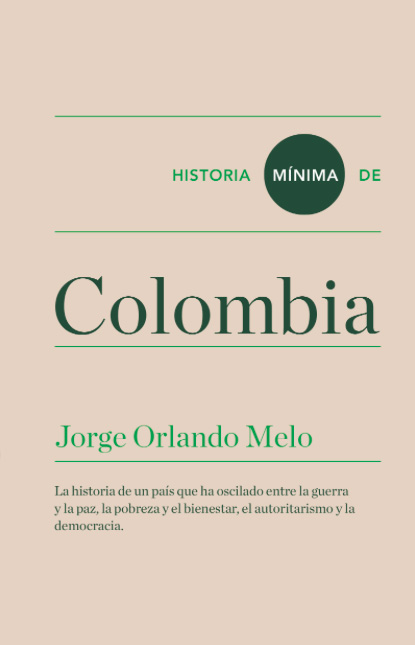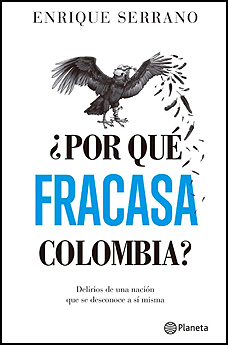Ruta de navegación
Menú de navegación
Blogs
Entries with label history of colombia .
[Jorge Orlando Melo, Historia mínima de Colombia. El high school de México-Turner. Bogotá, 2018. 330 p.]
review / María Gabriela Fajardo
 |
This history of Colombia written by Jorge Orlando Melo stands out for its evident effort of political neutrality. The processes, continuities and historical ruptures of the nation are mentioned without revealing any partisan tendency subject . The author tries to remain impartial in narrating the events that have brought Colombia to where it is today. This makes the work of Melo - born in Medellin in 1942, historian at the National University of Colombia and presidential advisor for human rights in 1990 - especially suitable for readers without a special knowledge of Colombian history, as they can judge for themselves the evolution of the creation of a nation where the State was first. This is precisely the purpose of the collection of "minimal histories" commissioned from the high school of Mexico.
A large part of the book is devoted to the colonial period, thus highlighting the importance of the historical report in the process of training of the country and in its current changes. It is not, therefore, the usual linear route through political events, but rather focuses on the cultural evolution of that report forged early and developed in successive social dynamics.
On the other hand, the role of the regions is an element core topic in the training of the colonial society, whose bequest is an inefficient central power, in a country where there are laws that seem to be negotiable, the society is divided into different social strata, the land belongs to a few and there is a constant political polarization at the hands of clientelist governments.
This happens in a Colombia in which the role of geography has been a determining factor in the processes of development of the nation. Melo speaks of isolated areas of difficult access, of very diverse subject: "islands of prosperity, security or healthiness in the middle of an ocean of poverty, violence and disease". That ocean has diminished today, but there are islands that continue to be the perfect route for drug trafficking.
The ideological struggles in Colombia have been intense: the Conservative Hegemony, of 32 years, was followed by the Liberal Hegemony, of 13; then came the era of the National Front, during which Conservatives and Liberals alternated in each period, creating an atmosphere of equilibrium and relative tranquility for a short deadline period of time. "The struggle between liberals and conservatives was, more than a political confrontation for electoral triumph, a holy war for different social models," writes Melo. However, this generated political exclusion and led to the training of groups outside the law, raised against the government and financed by drug trafficking. The confrontation made the institutional weaknesses visible and left little room for justice. Violence then became routine and ended up being Colombia's greatest historical failure, with special responsibility of those who promoted violence as an effective tool for social change.
For Melo, it is "human agency"-that is, the way in which people use their resources to adapt to circumstances-that defines history; it is men and women who, in their joint action, generate change and are the builders of their history. Unlike the most common position on Colombian history, Melo does not fall into determinism: he does not make reference letter to a culture of innate violence that naturally condemns Colombians to fight each other. On the contrary, he makes it clear that events such as April 6, Rojas Pinilla's coup d'état in 1953 or the bloody seizure of the Palace of Justice in 1985, must be seen in perspective and considered as moments of a social process.
The Colombian state did not achieve nationhood properly until the end of the 20th century, when the "dream of the creators of the nation" of having the whole territory covered by law, a single market and a political system was achieved. Colombia's unique history began with the Patria Boba, as the stage between the cry for independence and the battle of Boyacá, when the Creoles effectively achieved independence, is usually called. Since then there was a great lack of unity, manifested in an endless number of revolutions, reforms and constitutions. Colombia underwent an exhausting, exhausting and at the same time violent process aimed at achieving political, legal, economic and cultural cohesion throughout this extremely diverse country, with a geography that segmented it into regions, with varied and dispersed human groups.
But this past does not prejudge the future. The reader arrives at the end of this "Minimal History of Colombia" with the awareness of an open future for the great South American country. Colombia, once one of the most violent countries, now has a Nobel Peace Prize winner, is in a post-conflict process and has begun to be taken into account to a greater extent by the international community for its great progress.
[Enrique Serrano, ¿Por qué fracasa Colombia? Delirios de una nación que se desconoce a sí misma, Planeta, Bogotá 2016, 273 pages].
review / María Oliveros [English version].
Colombia's history has often been classified as one of the most violent. The long chapter of FARC terrorism or the confrontation of drug cartels are well present, but before that there were violent events in Colombia such as the Revolt of the Comuneros, the Thousand Days War or the Banana Plantation Massacre. A succession of events that has led most Colombians to believe that violence has characterized the country's history and that perhaps they can do little to avoid it.
That belief is challenged by Colombian communicator, philosopher and writer Enrique Serrano in ¿Por qué fracasa Colombia? Delusions of a nation that does not know itself. The book's purpose is to analyze why Colombia has not prospered more as a country. To answer that question, Serrano reviews in short chapters the Colombian mentality since the beginnings of the nation; there he finds reasons why Colombia is a country that has had a hard time getting ahead, growing in progress and being able to develop to its full potential.
 |
¿Por qué fracasa Colombia? is a risky book, which combats thoughts that have long remained in the minds of Colombians. Against that central belief that violence has characterized the country's history, Serrano warns from the very first pages: "It is also presumed that this is a nation plagued by the most vicious violence, from its beginnings to the present day. However, it has been more peaceful than violent, at least during most of its slow training and that although the importance of violence cannot be denied, it is episodic, recent, similar to that of other peoples in transition".
Serrano tries to expose the history of a country that does not begin in 1810 with the independence, but its origins go much further back, to the moment when the Spaniards arrived in America and settled in Colombia. All this in order to show the reader that during the three hundred years that followed the arrival of the first conquistadors, Colombia was a peaceful and measured nation.
Serrano's main premise is that those who arrived in Colombia were mostly new Christians, descendants of Arabs and Jews, coming from southern Spain, who were looking for a place provisional to settle and avoid the religious conflicts that were occurring in Spain at that time. The newcomers settled in small urbanizations, some far from others, not only because that was what the country's geography allowed, but also because the last thing they wanted was to come into conflict with other settlers, both European and indigenous, according to Serrano.
In fact, it is questionable whether the new settlers were dominated by a refractory private religious approach or whether the search for refuge for their consciences motivated, in most cases, their departure to America. It seems that the author adjusts the starting point thinking of those later aspects that he wants to explain.
The author also defends the thesis that in Colombia there was a racial miscegenation, but not a cultural miscegenation, because the indigenous culture was very weak, which contributed to the assumption of the religion brought by the Spaniards. In the culture that the Spaniards transmitted to the new generations were ideas such as provisionality or even getting used to failure: "They also had to react in a peaceful, non-violent way when events were unfavorable and they could not fulfill their desires. Therefore, a relative tolerance and awareness that the frustration of the achievement of desires is something probable, is in the old patterns of upbringing of the Colombian nation".
Serrano suggests that this mentality that originated centuries ago is still present in Colombia: the idea of not making the maximum effort, of not taking too many risks for fear of failure, of doing things half-heartedly so as not to lose too much in case they go wrong. Probably this mentality that was created over the years explains why urbanization projects in the country do not progress properly, why the subway project in the Colombian capital has not been able to materialize, or why it has cost the country so much to exploit its resources to the maximum.
Although the book touches on other aspects such as language, body hygiene and social classes, history is undoubtedly the fundamental component. Referring to historical events of the Colombian past, Serrano proposes a vision of national history far from the usual one. Thus, as has been said, his story does not begin with the cry for independence of 1810, but explains the Spanish society of the 15th and 16th centuries, in order to understand the mentality of the first men, women and families who arrived in America. It is an optimistic vision that seeks to share the idea that not everything has been suffering in Colombian history.
It is a fact that the country's history is not lived or remembered with much encouragement by Colombians. Remembering the past is for many a way of recalling the violence, wars and national polarization that began with the training of the two major parties, Liberals and Conservatives, in the mid-nineteenth century. Knowing the past well, in any case, is paramount for progress; that is what the new law decreed on January 1, 2018, which obliges all schools in the country to teach class Colombian History, seeks to do.
The book concludes with a series of suggestions about the present and the future. That last chapter, graduate Where can such a nation go? tries to transmit a feeling of hope, while at the same time it is a call to a high level of responsibility. According to the author, knowing the past and not running away from it, but accepting it in order to improve mentalities and habits, is what will give the country the basis for not failing.
